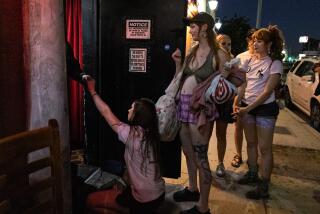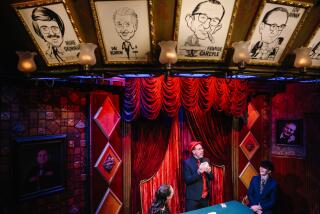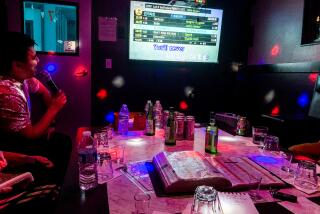Lou Williams’ Magic City foray raises a question: How does strip club social distancing work?
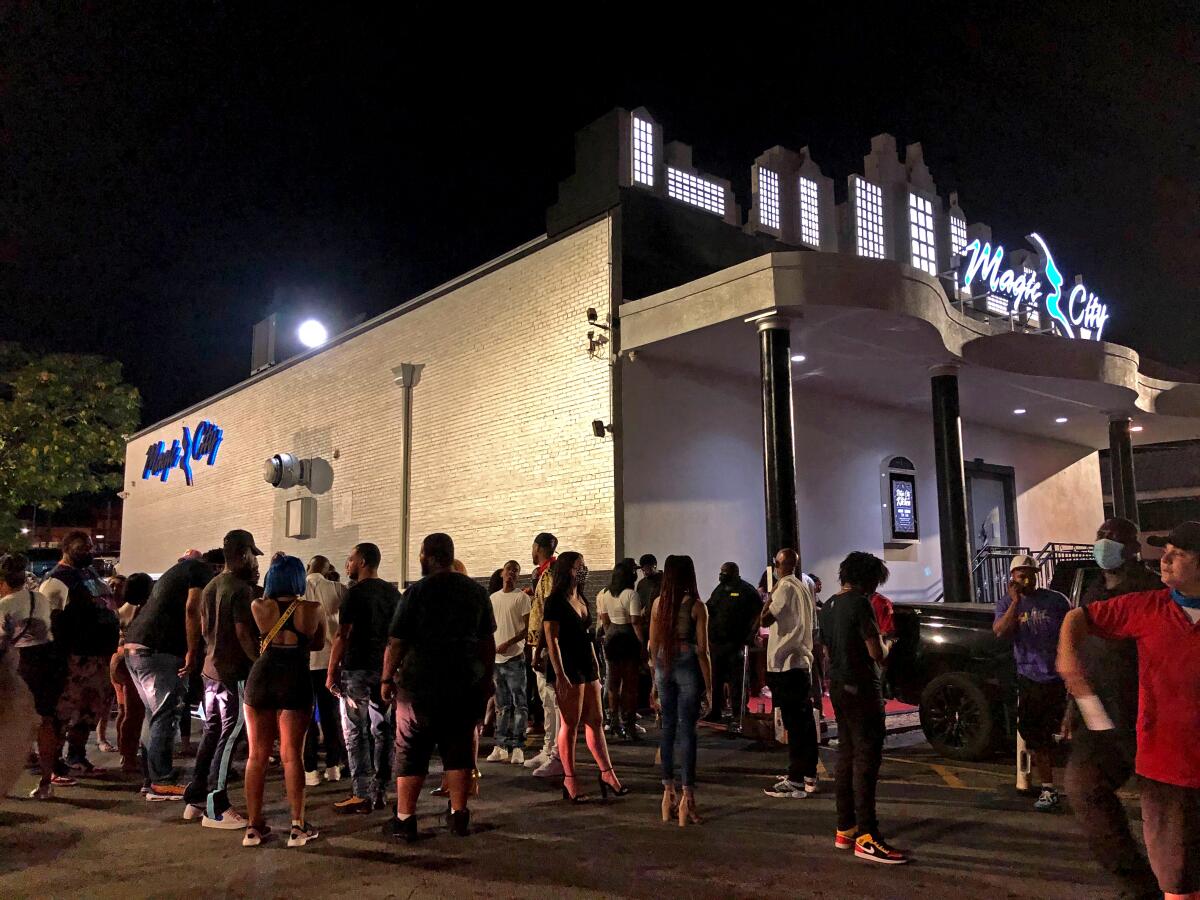
ATLANTA — It was just a few minutes after 6 p.m. at the Magic City strip club — early for a place that does not get going until long after dark — and already the DJ was pumping out hip-hop and dancers not inclined to social distancing were slipping out of lacy bralettes, sheer thongs and neon G-strings.
On an elevated platform, Aries, a 25-year-old dancer with close-cropped bleached hair, shook in front of a man and woman sharing a hookah. The woman patted Aries’ nude bottom with a dollar bill. Then another and another.
As the coronavirus rages across the Deep South, it was this institution, immortalized in scores of rap songs, that Clippers guard Lou Williams visited last week after he left the NBA bubble to attend a funeral. The league responded by ordering Williams to quarantine for 10 days, forcing him to miss the first two games of the NBA restart, which began Thursday.
Williams said he was dropping in on his favorite restaurant in Atlanta to get hot wings — a claim that seemed hard to believe for many sports fans, and raised a flurry of questions such as: Who goes to a strip club for its kitchen menu? How are businesses based on intimate dances and cash exchanges even open during a deadly pandemic? How does a strip club begin to navigate social distancing?
Adult clubs like Magic City that offer food, drink and live dance shows do not fit neatly into local government COVID-19 guidelines and orders for restaurants and bars. Any uncertainty about how to run the business amid the coronavirus appears exacerbated as Atlanta and Georgia officials spar on the need for stricter regulations.
Mayor Keisha Lance Bottoms, a Democrat, responded three weeks ago to the surge in COVID-19 cases in the Atlanta area by mandating that all residents wear face masks in public spaces and restaurants close dining rooms. But the city’s restrictions are not enforced — even as local hospitals reach capacity and scramble to treat COVID-19 patients in their emergency rooms — as Georgia Gov. Brian Kemp, a Republican, says the state’s less-stringent rules take precedence.
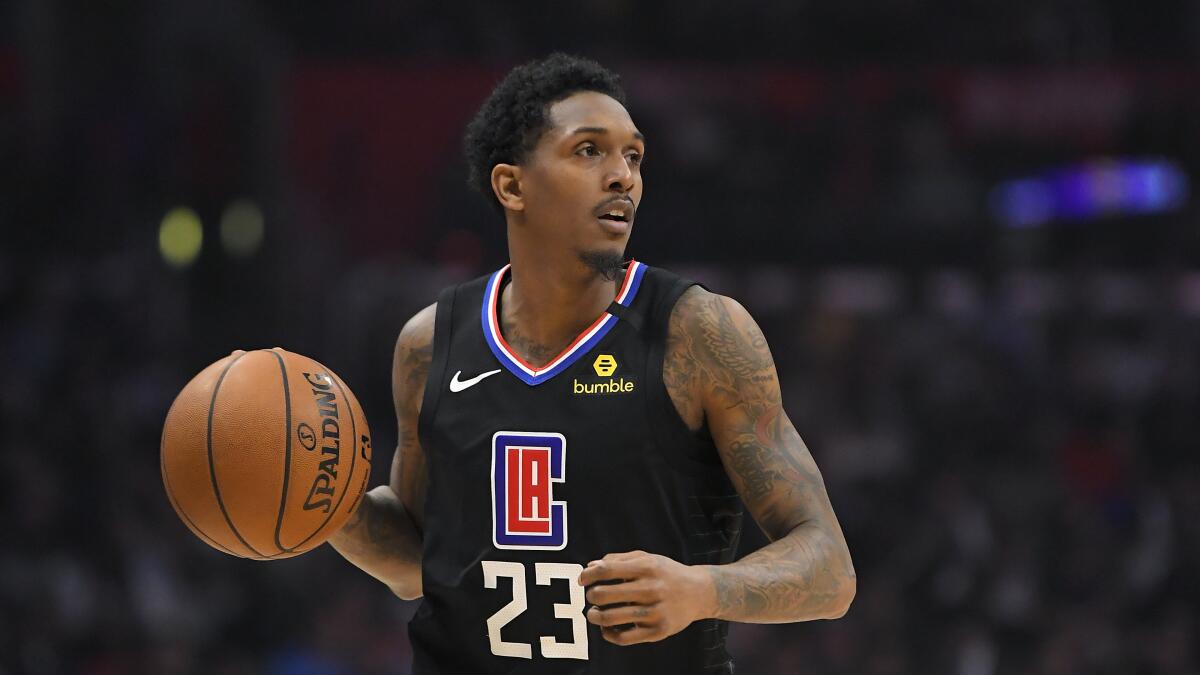
Magic City is one of many clubs that remain open in Fulton County, which has seen the highest number of coronavirus cases in Georgia: more than 17,000 confirmed infections and 380 deaths.
Outside the squat, silver-painted brick building in a forlorn stretch of downtown, a sign warned customers Monday that COVID-19 necessitated new rules.
“MASKS ARE REQUIRED TO ENTER,” read a piece of paper stuck to a pole near the entrance. “SOCIAL DISTANCING MEASURES MUST BE MAINTAINED.”
A security guard stood outside the door, raising a digital thermometer to the forehead of anyone who entered.
But stepping into the windowless room, it was clear it did not have the air of a post-coronavirus strip club that might pass the protective standards of Dr. Anthony Fauci. Dancers were not neatly spaced apart. They did not wear surgical masks or nitrile gloves. No Plexiglass separated them from patrons.
There were some concessions to the deadly virus. Bartenders wore masks and one wore a face shield. A giant plastic bottle of hand sanitizer sat at the edge of the bar, largely unused.
On the carpet between the bar and the H-shaped stage illuminated with blue LED strip lights, a trail of stickers spaced six feet apart urged people to keep their distance. But early in the evening, with barely more than 30 people in the room, patrons stood shoulder to shoulder as they huddled by the tiny Magic City Kitchen to order food and pick up to-go meals.
As the DJ blasted out a rap soundtrack, dancers pressed closer to customers and customers pressed closer to dancers, whispering into their ears or grinding against them.
“Nasty but classy! Oww!” the Miami rap duo, City Girls, snarled through the sound system.
More than three-quarters of customers, and the vast majority of dancers, were not wearing masks — and it was impossible to chat over the bass beat without getting close.
“I’m keeping as much distance as possible,” Aries said as she leaned into a reporter. Barely half an hour before, she had parted her legs as a man stood inches from her, brushing her crotch with dollar bills.
A Southern California native who went to Atlanta four months ago from Chicago, Aries said that working in the pandemic was a challenge, but she needed a job and many customers were tired of being cooped up at home.
She felt reassured that club management was proving diligent about checking the temperatures of customers and workers every day. And she, in turn, was taking care to respect customers’ boundaries.
“We all want to be safe,” she said. “Working in this industry, there’s a whole lot of stigma, so it’s important to make sure everyone feels comfortable.”
Working the day shift from 3 to 9 p.m., Aries said she danced last week for Williams, a regular at the club who has a dish named after him: the “Louwill Lemon Pepper BBQ wings.”
After placing an order with the Magic City kitchen, the high-scoring Clippers guard ambled around the club, Aries said, and she was one of a few dancers who performed for him, keeping a six-foot distance.
“He tipped very well,” she said.
Magic City is a hub of the billion-dollar hip-hop industry and a storied deal-making room where major league sports stars, rappers and R&B performers rub shoulders with local hip-hop wannabees, entrepreneurs, teachers and construction workers.
On Monday night, a steady stream of men lined up at the bar to exchange bills of large denominations for thick stacks of dollar bills along with $275 bottles of Hennessy. They held the bundles of money ostentatiously, lifting them up to their faces before tapping and slapping single bills on dancers who shook their bottoms.
“People are excited to be back out,” Michael “Lil Magic” Barney, the manager and founder’s son, said Monday evening as he surveyed the swelling crowd. “You might die next week . . . The stock market’s up right now!”
Many nightclubs and adult entertainment clubs across the nation have struggled as the Centers for Disease Control and Prevention recommends businesses change layouts to ensure that all customer parties remain at least six feet apart, rotate and stagger shifts, and require all staff to use cloth facing coverings.
Some clubs have shuttered as staff members tested positive for COVID-19 or local officials cited them for lack of social distancing. Others have switched to virtual platforms or drive-thru pole dances.
In the early days of the pandemic, Magic City closed and announced a switch to remote offerings, charging patrons $20 a month to log onto the club’s website to view live and prerecorded videos as well as “interactive lap dances.” But after Georgia lifted its restrictions on restaurants, bars and live performance venues, the club reopened in late June.
According to Kemp’s latest executive order, restaurants can open at full capacity but must require workers to wear face coverings while interacting with patrons and redesign seating arrangements to ensure a six feet separation between customers. Bars can allow up to 50 people or 35% total capacity and require all workers to wear face masks at all times.
Live performance venues must also require workers who have frequent contact with patrons to wear a face covering, except for when they are eating, drinking or struggling to breathe.
Shortly after 11:30 p.m. on Monday, Magic City, which has a maximum occupancy of 146 people, was packed and it was impossible to keep a six-foot distance.
Men and women pressed close to the stage as a parade of dancers — Dior, Jasmine, Binky, and Wifey — cavorted on poles.
Others sat at VIP tables, perusing properties on their cellphones, sharing hookahs and watching nude dancers perform for tips and then crawl on their knees to stuff cash into plastic grocery bags.
By midnight, the social distancing stickers near the bar floor were obscured by a blanket of dollar bills, Nikes and stilettos. And the party was just getting started.
More to Read
Sign up for Essential California
The most important California stories and recommendations in your inbox every morning.
You may occasionally receive promotional content from the Los Angeles Times.
